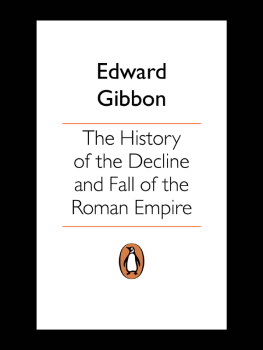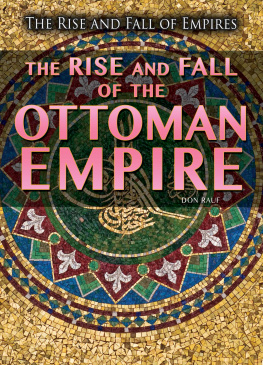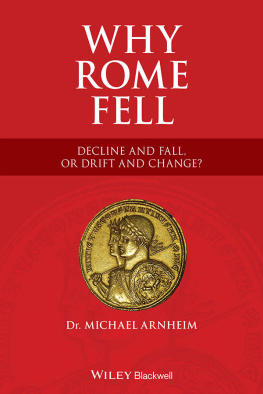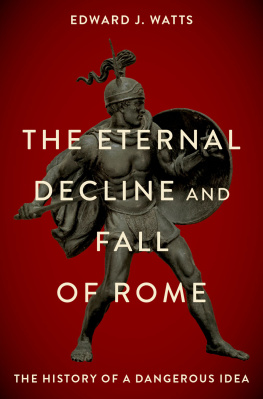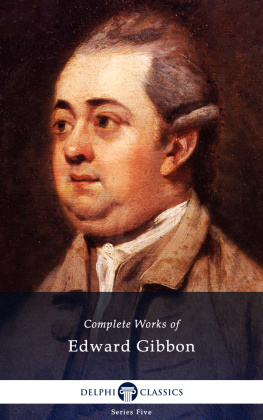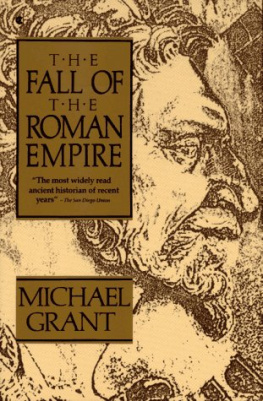Edward Gibbon - History of the Decline and Fall of the Roman Empire — Volume 6
Here you can read online Edward Gibbon - History of the Decline and Fall of the Roman Empire — Volume 6 full text of the book (entire story) in english for free. Download pdf and epub, get meaning, cover and reviews about this ebook. year: 2017, publisher: Independently Published, genre: Detective and thriller. Description of the work, (preface) as well as reviews are available. Best literature library LitArk.com created for fans of good reading and offers a wide selection of genres:
Romance novel
Science fiction
Adventure
Detective
Science
History
Home and family
Prose
Art
Politics
Computer
Non-fiction
Religion
Business
Children
Humor
Choose a favorite category and find really read worthwhile books. Enjoy immersion in the world of imagination, feel the emotions of the characters or learn something new for yourself, make an fascinating discovery.

- Book:History of the Decline and Fall of the Roman Empire — Volume 6
- Author:
- Publisher:Independently Published
- Genre:
- Year:2017
- Rating:4 / 5
- Favourites:Add to favourites
- Your mark:
- 80
- 1
- 2
- 3
- 4
- 5
History of the Decline and Fall of the Roman Empire — Volume 6: summary, description and annotation
We offer to read an annotation, description, summary or preface (depends on what the author of the book "History of the Decline and Fall of the Roman Empire — Volume 6" wrote himself). If you haven't found the necessary information about the book — write in the comments, we will try to find it.
History of the Decline and Fall of the Roman Empire — Volume 6 — read online for free the complete book (whole text) full work
Below is the text of the book, divided by pages. System saving the place of the last page read, allows you to conveniently read the book "History of the Decline and Fall of the Roman Empire — Volume 6" online for free, without having to search again every time where you left off. Put a bookmark, and you can go to the page where you finished reading at any time.
Font size:
Interval:
Bookmark:

Event, Of The Second And Third Crusades.St. Bernard.
Reign Of Saladin In Egypt And Syria.His Conquest Of
Jerusalem.Naval Crusades.Richard The First Of England.
Pope Innocent The Third; And The Fourth And Fifth Crusades.
The Emperor Frederic The Second.Louis The Ninth Of
France; And The Two Last Crusades.Expulsion Of The Latins
Or Franks By The Mamelukes.
[ Anna Comnena relates her father's conquests in Asia Minor Alexiad, l. xi. p. 321325, l. xiv. p. 419; his Cilician war against Tancred and Bohemond, p. 328324; the war of Epirus, with tedious prolixity, l. xii. xiii. p. 345406; the death of Bohemond, l. xiv. p. 419.]
[ The kings of Jerusalem submitted, however, to a nominal dependence, and in the dates of their inscriptions, (one is still legible in the church of Bethlem,) they respectfully placed before their own the name of the reigning emperor, (Ducange, Dissertations sur Joinville xxvii. p. 319.)]
[ Anna Comnena adds, that, to complete the imitation, he was shut up with a dead cock; and condescends to wonder how the Barbarian could endure the confinement and putrefaction. This absurd tale is unknown to the Latins. * Note: The Greek writers, in general, Zonaras, p. 2, 303, and Glycas, p. 334 agree in this story with the princess Anne, except in the absurd addition of the dead cock. Ducange has already quoted some instances where a similar stratagem had been adopted by Norman princes. On this authority Wilken inclines to believe the fact. Appendix to vol. ii. p. 14.M.]
[ 'Apo QulhV in the Byzantine geography, must mean England; yet we are more credibly informed, that our Henry I. would not suffer him to levy any troops in his kingdom, (Ducange, Not. ad Alexiad. p. 41.)]
[ The copy of the treaty (Alexiad. l. xiii. p. 406416) is an original and curious piece, which would require, and might afford, a good map of the principality of Antioch.]
[ See, in the learned work of M. De Guignes, (tom. ii. part ii.,) the history of the Seljukians of Iconium, Aleppo, and Damascus, as far as it may be collected from the Greeks, Latins, and Arabians. The last are ignorant or regardless of the affairs of Roum.]
[ Iconium is mentioned as a station by Xenophon, and by Strabo, with an ambiguous title of KwmopoliV, (Cellarius, tom. ii. p. 121.) Yet St. Paul found in that place a multitude (plhqoV) of Jews and Gentiles. under the corrupt name of Kunijah, it is described as a great city, with a river and garden, three leagues from the mountains, and decorated (I know not why) with Plato's tomb, (Abulfeda, tabul. xvii. p. 303 vers. Reiske; and the Index Geographicus of Schultens from Ibn Said.)]
[ For this supplement to the first crusade, see Anna Comnena, (Alexias, l. xi. p. 331, &c., and the viiith book of Albert Aquensis.)]
[ For the second crusade, of Conrad III. and Louis VII., see William of Tyre, (l. xvi. c. 1819,) Otho of Frisingen, (l. i. c. 3445 59, 60,) Matthew Paris, (Hist. Major. p. 68,) Struvius, (Corpus Hist Germanic, p. 372, 373,) Scriptores Rerum Francicarum Duchesne tom. iv.: Nicetas, in Vit. Manuel, l. i. c. 4, 5, 6, p. 4148, Cinnamus l. ii. p. 4149.]
[ For the third crusade, of Frederic Barbarossa, see Nicetas in Isaac Angel. l. ii. c. 38, p. 257266. Struv. (Corpus. Hist. Germ. p. 414,) and two historians, who probably were spectators, Tagino, (in Scriptor. Freher. tom. i. p. 406416, edit Struv.,) and the Anonymus de Expeditione Asiatic Fred. I. (in Canisii Antiq. Lection. tom. iii. p. ii. p. 498526, edit. Basnage.)]
[ Anne, who states these later swarms at 40,000 horse and 100,000 foot, calls them Normans, and places at their head two brothers of Flanders. The Greeks were strangely ignorant of the names, families, and possessions of the Latin princes.]
[ It was this army of pilgrims, the first body of which was headed by the archbishop of Milan and Count Albert of Blandras, which set forth on the wild, yet, with a more disciplined army, not impolitic, enterprise of striking at the heart of the Mahometan power, by attacking the sultan in Bagdad. For their adventures and fate, see Wilken, vol. ii. p. 120, &c., Michaud, book iv.M.]
[ William of Tyre, and Matthew Paris, reckon 70,000 loricati in each of the armies.]
[ The imperfect enumeration is mentioned by Cinnamus, (ennenhkonta muriadeV,) and confirmed by Odo de Diogilo apud Ducange ad Cinnamum, with the more precise sum of 900,556. Why must therefore the version and comment suppose the modest and insufficient reckoning of 90,000? Does not Godfrey of Viterbo (Pantheon, p. xix. in Muratori, tom. vii. p. 462) exclaim? Numerum si poscere quras, Millia millena militis agmen erat.]
[ This extravagant account is given by Albert of Stade, (apud Struvium, p. 414;) my calculation is borrowed from Godfrey of Viterbo, Arnold of Lubeck, apud eundem, and Bernard Thesaur. (c. 169, p. 804.) The original writers are silent. The Mahometans gave him 200,000, or 260,000, men, (Bohadin, in Vit. Saladin, p. 110.)]
Font size:
Interval:
Bookmark:
Similar books «History of the Decline and Fall of the Roman Empire — Volume 6»
Look at similar books to History of the Decline and Fall of the Roman Empire — Volume 6. We have selected literature similar in name and meaning in the hope of providing readers with more options to find new, interesting, not yet read works.
Discussion, reviews of the book History of the Decline and Fall of the Roman Empire — Volume 6 and just readers' own opinions. Leave your comments, write what you think about the work, its meaning or the main characters. Specify what exactly you liked and what you didn't like, and why you think so.

